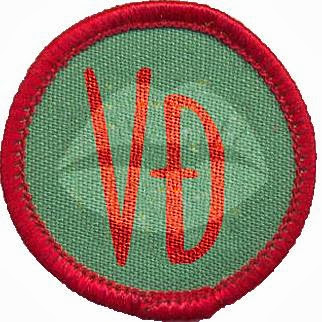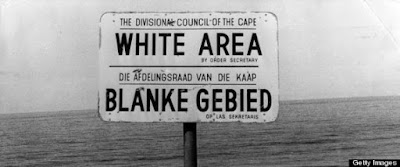On Vd and 'the Divide'

Here is an explanation of the words 'Vđ', the 'letters after my name'.
It was not a name I chose for myself. It was a slur given to me by a group of people who called me and others the 'verbal disabled'.
Some of us have chosen to adopt this name and wear it like a Star of David - I choose to speak my truth and turn hate speech around.
I wrote that when I was really angry and hurt and upset.
Unlike many other people with disability, I have not grown up being discriminated against. I have never been the subject of hate speech - not a cripple nor a retard nor a coon nor a slanteye. None of those hateful and hurtful words, because I grew up as one of us, not one of them.
The other day, a young person gave me a powerful gift. She burst into tears, and sobbed with complete anguish over some bad news. She had held it together all day, but when she had finished, she cried.
It made me think about how generous some people are with their emotions - it is a powerful gift, to express something in a way that others will instantly understand. Whether it is your grief or anguish or rage or horror or outrage or anger or joy or hopefulness.
I've always liked other people who laugh with abandon - throw back their heads and laugh uproariously. And I'm confused by those people who hide their feelings, even when it's accidental - out of a sense of propriety, or because of the way they've been brought up.
That brings us to VD.
The women who badged me and others who can advocate for themselves called us this name because we are not one of 'them', in their opinions. Not the women themselves, but their children, who have severe and profound intellectual disability. They see wheelchair users and people with sensory impairments as being the least of the disadvantaged in the hierarchy of disability, and that is sometimes true when it comes to voice. But sometimes it is not.
I have thought about this for a long time.
I remember reading a productivity commission submission from one angry, bitter parent. I blame her not at all for being angry and bitter. I would be the same, in her circumstance. Here's her world view on disability -
The key focus should be on those PWD who have the highest needs and are at most risk of being forever marginalised in our society; those PWD who are severely to profoundly intellectually disabled. To me, there is a hierarchy of disability; some disabilities are more acceptable to the general public than others. I have summarised the hierarchy as:
1. People who are accepted, welcomed and championed. People who have full intellectual capacity, are articulate, have some physical disability and who perform in elite sports or achieve incredible feats of endurance and perseverance. For example the downhill skier with one leg, the blind man who climbs Mt Everest, the quadriplegic professional singer, the beautiful female doctor who was born without lower leg bones, (she gave a TED talk this year). In other words the Michael Miltons of the world.
2. People who are accepted and welcomed. People who have full intellectual capacity, are articulate and have some physical disability and who use a wheel chair. They may hold positions of influence and/or power. They might run companies or organisations.
3. People who are accepted. People who have full intellectual capacity but might use technology or signing to communicate; speech machine, computer, iPad.
4. People who are reservedly accepted. People who have a mild intellectual disability but who can work, converse, sit at a table and feed themselves, catch a bus, form friendships, speak for themselves.
5. People who are not accepted and might be avoided, shunned, ignored. The more intellectually disabled a person is, the more of a pariah they are. From this point on PWD become more marginalised depending on how many of the following added disabilities they have:
a. Communicate in ways other than speech (“Oh they don’t speak and so they don’t communicate.”) b. Have no receptive language c. Are doubly incontinent so they need personal care every day and forever d. Do not know how to have a reciprocal relationship with a person and cannot form friendships e. Drool or dribble f. Speak unintelligibly g. Wave their arms, legs and heads around in unpredictable and unattractive ways h. Make unconventional noises i. Need feeding
Let me be clear. I do not adore this woman. But she has articulated what she feels and what many others feel about the way exceptionally disadvantaged people with disability are viewed by the rest of the world. And in many regards, she is right.
Here's the rub - it's not that uncomplicated.
What if the quadruplegic professional singer, so uncomplicated from the outside, shares the same issues with service coordination and funding as the person with a severe and profound intellectual disability? And how included can that person be in the world if they cannot leave their home, or live in an institution?
Why is a person with a 'mild intellectual disability' more advantaged because they are 'reservedly accepted'? They are more likely to be victims of financial abuse, homelessless or be unsupported, mostly because they are not 'disabled enough'. Conversely, why should a person with a mild intellectual disability not be an elite sportsman, display extraordinary feats of perseverance and endurance, climb Mt Everest?
What if you have a 'voice', but you're so scared of losing what you have, you're afraid to use it? What happens if you have been marginalised or abused or neglected or institutionalised all your life, and you still bear the scars?
What if any one of the above 'groups' of people are also affected by a debilitating psychosocial disability? Unrecognised or untreated because you do not fit into the right 'group', or that you're homeless or have drug and alcohol issues or that you're the wrong colour or religion. What happens if any one of us can't be supported in the right way to be who we are?
Why are we all regarded so differently?
A friend talks about the disabled as 'my people'. I understand why. We have nothing in common when it comes to personality or ability or family support or world views or colour or spirituality - but we face the same barriers when it comes to be being included, societal and attitudinal barriers, ableism, poverty, barriers caused by other types of disadvantage.
I watched my friend sobbing and thought about that generosity of spirit and expression, and how we can use that to our advantage. We need to understand each other more fully, all of us. You can't be kind to someone if you don't understand them.
I straddle both sides of the fence, as a caregiver and a person with a disability, and it is a complicated place to be.
For me, this the most complicated argument.
When an disabled advocate speaks about the closure of institutions, I see some parents bristle and spit. The disabled person might be saying, 'This is my experience - I lived in an institution, and it was not a good thing. There is research that says that it is a bad thing for people with disability to live together.'
But those particular parents hear only, 'I do not understand your crisis and your pain.
I have lofty ideals and I am trying to inflict them on your child, who is nothing like me.
I do not understand your world, nor do I care to.
I do not understand that you cannot do this anymore, that you are living in crisis.
I do not understand that you are riddled with guilt as well as grief and anger, because the best you can do is never going to be good enough, just because your child is disabled.
I do not see or understand your fear and constant worry that you will die before your child and that they would be 'better off dead'.
I do not know that you sometimes resent your child or your circumstance in your heart of hearts, that it is as much as you can do to keep your child nourished and hydrated and safe and clean, and that happiness is way, way down the end of the ladder - and I do not see your love.
I do not understand that you are trying your hardest.
I cannot possibly know or understand you - I am the enemy.'
What we need to do is learn to listen to people properly and be generous with our stories and bridge that divide by shared understanding. And I'm not sure how that will happen.
I will keep my 'verbal disabled' badge, because I earned it. We need to continue talking, no matter what. And we're not going to make change if we don't.



Good one Sam!,
ReplyDeleteYou write well. I am envious . Much love .
ReplyDeleteThis comment has been removed by the author.
ReplyDeleteDangerously eloquent, well done again Sam.
ReplyDelete